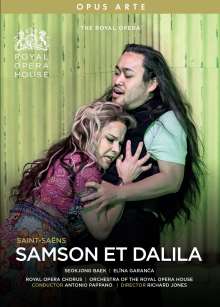Richard Jones’ Inszenierung überträgt die biblische Handlung von Samson et Dalila in einen modernen, äußerst brutalen Polizeistaat in einem mehr als bizarren Bühnenbild und mit nicht immer ganz verständlichen Referenzen. Auf der einen Seite haben wir die spärliche Ausstattung, die die Juden charakterisieren soll, auf der anderen Seite sehen wir das bunte Bild des opulenten Materialismus, das für die Philister steht.
Und dies ist daher eine weitere Oper, bei der ich das Bild ausschalte und nur den Ton höre (was zugegebenermaßen nicht gerade der Sinn einer DVD ist). Der Hörer erlebt dann, vom Bild befreit, eine gute musikalische Leistung mit dem hervorragenden Gesang von Seokjong Baek als Samson und der wunderbaren Mezzosopranistin Elina Garanca als Dalila. Die anderen Rollen sind gut besetzt, und der Chor und das Orchester sind großartig unter der inspirierten Leitung von Antonio Pappano, der dem Werk mit seinem flüssigen Dirigat viel musikalische Substanz verleiht.
Richard Jones’ production transposes the biblical plot of Samson et Dalila into a modern, extremely brutal police state in a more than bizarre setting with references that are not always entirely understandable. On the one hand, we have the sparse décor that is supposed to characterize the Jews, on the other, we see the colourful image of the opulent materialism that stands for the Philistines.
And so we have here yet another opera where I switch off the picture and only listen to the sound (which, admittedly, is not exactly the purpose of a DVD). The listener is then released from the image and experiences a good musical performance with the excellent singing of Seokjong Baek as Samson and the wonderful mezzo-soprano Elina Garanca as Dalila. The other roles are well cast, and the chorus and orchestra are magnificent under the inspired direction of Antonio Pappano, who gives the work a great deal of musical substance with his fluid conducting.




















